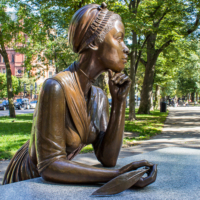Celebrations of Phillis Wheatley’s Boston Pub Date
At the end of November 1773, the ship Dartmouth was moored in Boston’s inner harbor, watched by a militia-style patrol of volunteers to ensure the tea it carried was not unloaded and taxed.
The Rotch family’s vessel, under the command of James Hall, brought other cargo as well. Among those items were copies of Phillis Wheatley’s Poems on Various Subjects, Religious and Moral.
Wheatley had recently become legally free, and she was counting on sales of those books for her income.
Fortunately, by 1 December the local Whigs made clear that everything could be unloaded from the Dartmouth except the East India Company tea, so the books came ashore.
Historians only recently recognized the connection between Wheatley’s book and the Boston Tea Party because no one mentioned it at the time. Wheatley may have been worried 250 years ago today, but by the time she was writing the letters that survive she had her books on dry land and was busy promoting orders.
Wheatley wrote that her books would arrive “in Capt. Hall,” using the common way of referring to a ship by its master rather than its name. About ten years ago Wheatley biographer Vincent Carretta, researcher Richard Kigel, and others realized that the captain of that name arriving in Boston around that time had to be James Hall on the Dartmouth.
The sestercentennial of the Tea Party thus coincides with the sestercentennial of the publication of Phillis Wheatley’s book in America, and both events are being commemorated this season.
Ada Solanke’s play Phillis in Boston will have its last performances for the year in Old South Meeting House, the poet’s own church, on Sunday, 3 December. That site-specific drama depicts the poet, her friend Obour Tanner, her husband-to-be John Peters, her recent owner Susannah Wheatley, and abolitionist Prince Hall. Order tickets here.
The next evening, 4 December, the Boston Public Library will host “Faces of Phillis,” a free program discussing the poet from various perspectives. It will start with a staged reading of parts of Solanke’s plays about Wheatley. Then there will be a panel featuring Solanke, sculptor Meredith Bergmann, and Kyera Singleton of the Royall House & Slave Quarters museum. The evening will conclude with Boston’s Poet Laureate, Porsha Olayiwola, performing a dramatic reading of her own work and one of Wheatley’s poems.
“Faces of Phillis” is scheduled to last from 6:00 to 7:30 P.M. Register for that event here.
The Rotch family’s vessel, under the command of James Hall, brought other cargo as well. Among those items were copies of Phillis Wheatley’s Poems on Various Subjects, Religious and Moral.
Wheatley had recently become legally free, and she was counting on sales of those books for her income.
Fortunately, by 1 December the local Whigs made clear that everything could be unloaded from the Dartmouth except the East India Company tea, so the books came ashore.
Historians only recently recognized the connection between Wheatley’s book and the Boston Tea Party because no one mentioned it at the time. Wheatley may have been worried 250 years ago today, but by the time she was writing the letters that survive she had her books on dry land and was busy promoting orders.
Wheatley wrote that her books would arrive “in Capt. Hall,” using the common way of referring to a ship by its master rather than its name. About ten years ago Wheatley biographer Vincent Carretta, researcher Richard Kigel, and others realized that the captain of that name arriving in Boston around that time had to be James Hall on the Dartmouth.
The sestercentennial of the Tea Party thus coincides with the sestercentennial of the publication of Phillis Wheatley’s book in America, and both events are being commemorated this season.
Ada Solanke’s play Phillis in Boston will have its last performances for the year in Old South Meeting House, the poet’s own church, on Sunday, 3 December. That site-specific drama depicts the poet, her friend Obour Tanner, her husband-to-be John Peters, her recent owner Susannah Wheatley, and abolitionist Prince Hall. Order tickets here.
The next evening, 4 December, the Boston Public Library will host “Faces of Phillis,” a free program discussing the poet from various perspectives. It will start with a staged reading of parts of Solanke’s plays about Wheatley. Then there will be a panel featuring Solanke, sculptor Meredith Bergmann, and Kyera Singleton of the Royall House & Slave Quarters museum. The evening will conclude with Boston’s Poet Laureate, Porsha Olayiwola, performing a dramatic reading of her own work and one of Wheatley’s poems.
“Faces of Phillis” is scheduled to last from 6:00 to 7:30 P.M. Register for that event here.



